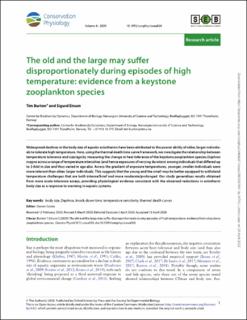| dc.contributor.author | Burton, Tim | |
| dc.contributor.author | Einum, Sigurd | |
| dc.date.accessioned | 2022-05-04T11:19:53Z | |
| dc.date.available | 2022-05-04T11:19:53Z | |
| dc.date.created | 2020-10-05T11:21:07Z | |
| dc.date.issued | 2020 | |
| dc.identifier.citation | Conservation Physiology. 2020, 8 . | en_US |
| dc.identifier.issn | 2051-1434 | |
| dc.identifier.uri | https://hdl.handle.net/11250/2994145 | |
| dc.description.abstract | Widespread declines in the body size of aquatic ectotherms have been attributed to the poorer ability of older, larger individuals to tolerate high temperature. Here, using the thermal death time curve framework, we investigate the relationship between temperature tolerance and size/age by measuring the change in heat tolerance of the keystone zooplankton species Daphnia magna across a range of temperature intensities (and hence exposures of varying duration) among individuals that differed up to 3-fold in size and thus varied in age also. Across the gradient of exposure temperatures, younger, smaller individuals were more tolerant than older, larger individuals. This suggests that the young and the small may be better equipped to withstand temperature challenges that are both intense/brief and more moderate/prolonged. Our study generalizes results obtained from more acute tolerance assays, providing physiological evidence consistent with the observed reductions in ectotherm body size as a response to warming in aquatic systems. | en_US |
| dc.language.iso | eng | en_US |
| dc.publisher | Oxford University Press | en_US |
| dc.rights | Navngivelse 4.0 Internasjonal | * |
| dc.rights.uri | http://creativecommons.org/licenses/by/4.0/deed.no | * |
| dc.title | The old and the large may suffer disproportionately during episodes of high temperature: evidence from a keystone zooplankton species | en_US |
| dc.title.alternative | The old and the large may suffer disproportionately during episodes of high temperature: evidence from a keystone zooplankton species | en_US |
| dc.type | Peer reviewed | en_US |
| dc.type | Journal article | en_US |
| dc.description.version | publishedVersion | en_US |
| dc.source.pagenumber | 7 | en_US |
| dc.source.volume | 8 | en_US |
| dc.source.journal | Conservation Physiology | en_US |
| dc.identifier.doi | 10.1093/conphys/coaa038 | |
| dc.identifier.cristin | 1837016 | |
| dc.relation.project | Norges forskningsråd: 223257 | en_US |
| cristin.ispublished | true | |
| cristin.fulltext | original | |
| cristin.qualitycode | 1 | |

